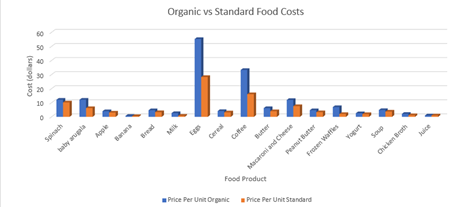Organic Food is Not Better for You or the Environment

Average difference in cost between organic and traditional for common foods
On the surface, the USDA certification for organic looks more environmentally friendly and safer for consumption. The common thought is that USDA organic has a cost-to-benefit ratio. You pay more, and you get more environmentally friendly healthier food. This concept is continually disproved as more research has gone into the topic. Conventional farming has shown that it is better for humans and the environment.
Chemicals and pesticides that are put onto foods are deemed toxic to humans. The Environmental Protection Agency (EPA) has established the Reference Dose (RfD). The RfD is the maximum amount of pesticides a human can consume daily without having any health effects down the line. While a half cup of strawberries (if not washed) can hold up to .15mg of pesticides that can be consumed, the RfD sits at 1.5mg daily (Nutrition Pro Consulting). Many humans consume more than the RfD putting them at risk. In addition, many pesticides run off into local waterways polluting the waters, which is dangerous to the wildlife ecosystems that live in them. Sabrina Bates, a Pennridge High School environmental science teacher, stated, “Look into a farm’s environmental procedures. There is some difference between traditional and organic farming. The procedures done by organic farms are certified and eliminate pesticides, but the people who run the farm and protect the environment are more important.” These procedures are consistent throughout all organic farms, certifying no pesticide use. If you buy nonorganic from a grocery store, you cannot be sure of the number of pesticides used on those foods. Bates added, “You see more consistency in organic farming. No farm can have a procedure that falls out of line with the USDA guidelines. With conventional farming, you could have a farm that is very unhealthy and bad for the environment.”
The biggest concern around conventional fruits is cancer from pesticides. While pesticides can be dangerous, a study done in a gimlet media podcast found no difference in cancer rates between traditional and organic food eaters (Gimlet). Tom Cramer, a local Pennridge parent, stated, “my family’s health is my biggest concern. If I knew that organic farming was healthier, I would buy organic food. Until research shows a difference, I won’t buy organic.” Studies also found that using manure (a USDA-approved fertilizer) instead of pesticides results in more nitrogen leakage into waterways than traditional (Gimlet). In addition, organic is consistently much more expensive to the consumer than organic.
When purchasing organic or conventional foods, investigate your local farms’ tactics to reduce the pollution of waterways and protection of the environment. For the average consumer, rethink what is safer for your local environment and your wallet.
https://www.nutritionproconsulting.com/post/shouldyouworryaboutthedirtydozenlist
Tommy Cramer, Grade 12. Interests/hobbies include motor vehicle riding, cooking, piano, golf, basketball, car rides with my friends, and traveling with...




